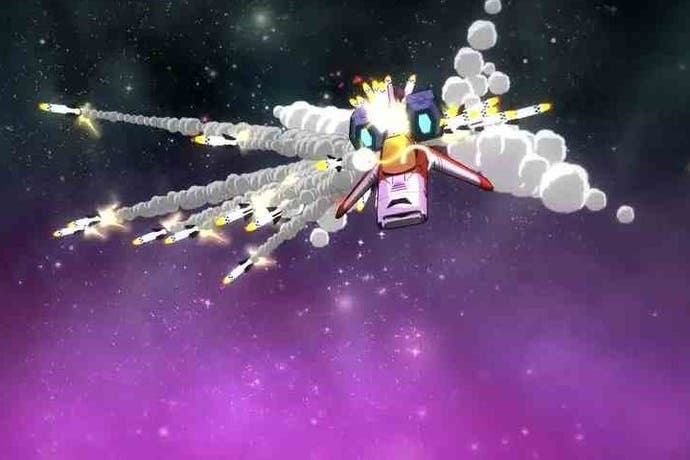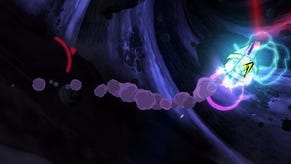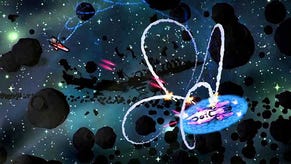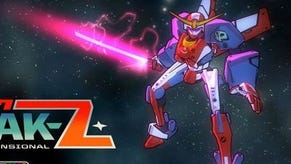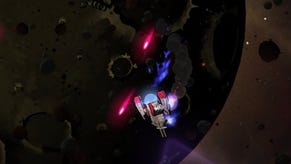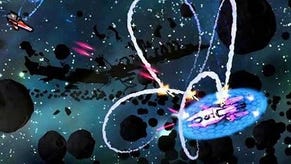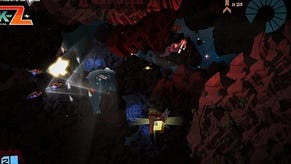Galak-Z: The Dimensional review
FML.
Don't be fooled by the bragging, wisecracking pilot, the soaring Saturday morning cartoon soundtrack, or that evocative scarlet spaceship - the kind that has flown through countless boyhood dreams, turning aliens to green mush and asteroids to fine space dust. All of that can be found in 17-Bit's anime-inspired heroic space shoot-'em-up, Galak-Z: The Dimensional. But beneath the paint, this is, in Christian Donlan's enviable phrase, a catastrophe game. In other words, it comes to life not when you're laying waste a squadron of Imperial fighters to the sound of a Joe Satriani-esque guitar solo, but when you're trembling in the nook of some space cavern, health bar blinking on a sliver, wondering how the hell you're going to make it back to the Axelios mothership in one piece.
Galak-Z might share a general aesthetic with Gradius and the other classic arcade space shoot-'em-ups, but structurally and philosophically its closest relative is Spelunky, with all of the challenge that association implies. As in Derek Yu's modern masterpiece, much of your time is spent burrowing into rock (in this case, vast asteroids, whose interiors are a cosy warren of corridors and chambers) in search of treasure. No chests overflowing with gold or jewels here. Rather, pieces of idle space junk, either harvested from downed enemies or caches, which can be spent on buying upgrades for your own craft. While each stage has a goal (usually to destroy an Imperial satellite, or to move an object from one place to another), your primary task is hunter-gathering. You collect the trash. You hunt the upgrades.
Galak-Z is a roguelike: the arrangement of each stage's items, enemies and asteroids changes with every attempt. As such, if you wish to triumph, you must learn not maps and layouts but patterns and principles. Your ship is nimble. It can fly in all directions, boost away from (or into) danger, strafe, fire lock-on missiles and even leap over enemy bullets with a well-timed button press. It can be customised with different types of shot - wide-angled or tight-angled, freezing or burning - and once you clear the first clutch of stages, it becomes vastly more flexible in ways that it would be a shame to spoil. The trick is learning to match the response to the situation.
Space is perilous, of course, but perhaps in more ways than you were expecting. There are the patrolling Imperial drones, which will lock onto your position if they are in range of the sound of your engines. There are the freelance marauders, who will taunt you from their higgledy rigs. There are the kind of alien blobs that drift like deep sea fish, and there are the sneakier sort, who will lure you in with a cluster of space junk then pincer you from behind a rock. Later, there are hulking mecha, with arcing plasma swords. But the game's difficulty isn't only derived from these tangible threats. There are also structural obstacles to easy progress.
Galak-Z is divided into five seasons (aping the TV show format, with end credits after each). Each season is comprised of five random stages, which must be successfully completed in sequence. If you die at any point during this sequence, you are returned to the beginning of the season; all progress is lost and your ship's upgrades discarded. It's a brutal design, and the only way around its strict demands is to collect 'Chase' coins during a run. These are automatically cashed in when you die, giving you 250 credits per coin on which to re-tool your ship on the subsequent run. Manage to collect five coins and you have the chance to pay to retry the stage without losing progress, although all of your weapons and items must be recovered from within the level first - a rare and costly concession to a design that aims to keep you from victory.
Thanks to the fact that the game will often place a gaggle of powerful foes right by the exit point, you'll often lose an hour's progress, seemingly on the roll of a die. While this is always frustrating, Galak-Z is nevertheless a game that improves the worse your circumstances are. When your life is depleted and you're on the rocks, it forces you to slow down, to prepare your mind and fingers and to consider your options. When you finally tear once more into the breach, unsure of whether or not you will make it out the other side, the stakes are sufficiently high and your chances sufficiently low to allow for moments of genuine glory.
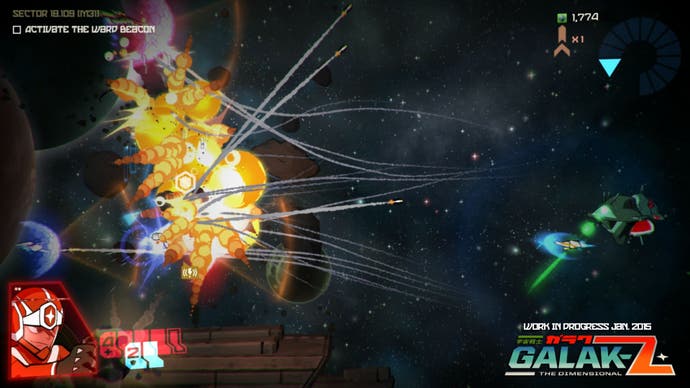
Catastrophe games succeed or fail in the way in which they balance planning and luck. If our progress is too dependent on fortune, then we feel inconsequential. If it's too dependent on planning, then the roguelike elements will seem tacked-on. Galak-Z strikes an almost perfect balance. Some pick-ups will vastly improve your chances - one upgrade will automatically restore one unit of health after each stage, freeing up money to spend on non-restorative additions to your ship - but they're always offset by challenges that require talent and dexterity.
Nevertheless, Galak-Z falls just shy of genius. That it quickly reveals itself to be a demanding game is no surprise considering its lead designer's heritage (Jake Kazdal worked at Sega on exquisite yet challenging titles such as Rez) and the source material from which it draws inspiration. The game makes far more demands on the hands than Spelunky; only the most dextrous will make it to the game's conclusion. Space cadets need not apply. And unlike, say, Dark Souls, which counterbalances its strictness with largely dependable enemy placement and behaviour, in Galak-Z the randomness that comes with each retry adds, arguably, one layer of complication too many.
Galak-Z's highs and lows are beguiling, its design is elegant, and there's a great deal of appeal in its single-minded vision. But few will earn the chance to see all that it has to offer.
